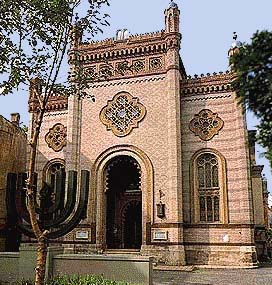In fact, Jews probably first arrived along with the Roman legions who invaded Dacia (today’s Romania) in 101 A.D.
During the Middle Ages Jewish immigrants began settling in Wallachia and Moldavia. By the early 16th century, their numbers once again swelled by the arrival of immigrants (Ashkenazim Jews) fleeing persecution from Cossack uprisings in Poland and Ukraine. During the region’s domination by the Turks, the Romanian Jewish community evolved into a prosperous middle class in charge of much of the country’s trade.
The modern story of Romania’s Jews mirrors the experience of other Eastern European Jewish communities: a dynamic cultural and spiritual life in the face of recurrent periods of anti-Semitism. After World War I, when Transylvania joined Wallachia and Moldavia to form present day Romania, the country’s Jewish population increased from about 240,000 to about 750,000 virtually overnight. After World War II, emigration to Israel and other countries left fewer than 20,000.
Today visitors will find poignant reminders of Romania’s Jewish heritage and their own Jewish roots. The country is unique in Eastern and Central Europe for its scores of well-maintained synagogues and cemeteries in use by Jewish communities scattered throughout Romania.
Romanian synagogues are of several types. Bucharest's synagogues have a Moorish style.
In Transylvania, architectural styles resemble those of their Hungarian counterparts: impressive and elaborately decorated synagogues dating to the late 19th and early 20th centuries. In Moldavia, folk-style synagogues are unadorned on the outside but highly decorated inside with native paintings and lavish wood carving.

Jewish heritage places of interest:
Bucharest: the Choral Temple (1845),
the Great Synagogue, Yeshua Tova Synagogue, the Jewish Museum.
Sighet Marmatiei: (the birthplace of
1986 Nobel Prize winner, writer Elie Wiesel) the Great Synagogue.
Iasi: The Great Synagogue (1670);
the Jewish History Museum; home of the world's first Yiddish Theatre (1876).
Jewish Community Centers:
Bucharest: 9-11 Sfanta Vineri St.
Tel: (40-1)313.25.38
Iasi: 15 Elena Doamna St.
Tel: (40-32)114.414
Satu Mare: 4 Decebal St.
Tel: (40-61)743.783
